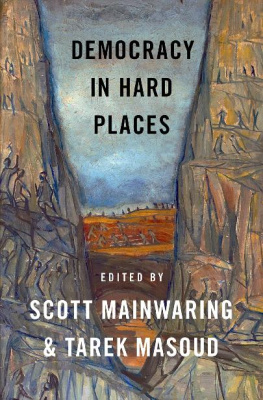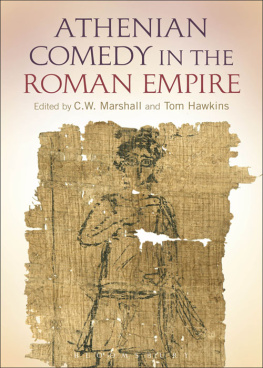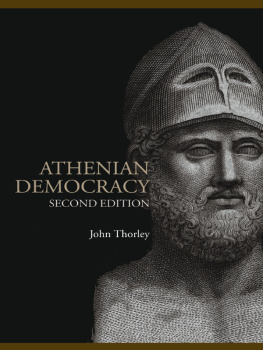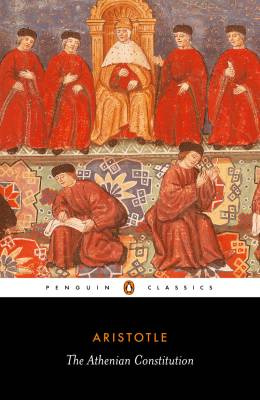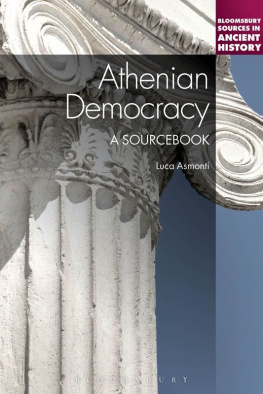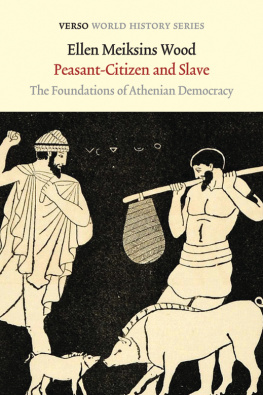Alev Scott - The Enduring Legacy of Athenian Democracy
Here you can read online Alev Scott - The Enduring Legacy of Athenian Democracy full text of the book (entire story) in english for free. Download pdf and epub, get meaning, cover and reviews about this ebook. year: 2020, publisher: Pegasus Books, genre: Religion. Description of the work, (preface) as well as reviews are available. Best literature library LitArk.com created for fans of good reading and offers a wide selection of genres:
Romance novel
Science fiction
Adventure
Detective
Science
History
Home and family
Prose
Art
Politics
Computer
Non-fiction
Religion
Business
Children
Humor
Choose a favorite category and find really read worthwhile books. Enjoy immersion in the world of imagination, feel the emotions of the characters or learn something new for yourself, make an fascinating discovery.

- Book:The Enduring Legacy of Athenian Democracy
- Author:
- Publisher:Pegasus Books
- Genre:
- Year:2020
- Rating:4 / 5
- Favourites:Add to favourites
- Your mark:
- 80
- 1
- 2
- 3
- 4
- 5
The Enduring Legacy of Athenian Democracy: summary, description and annotation
We offer to read an annotation, description, summary or preface (depends on what the author of the book "The Enduring Legacy of Athenian Democracy" wrote himself). If you haven't found the necessary information about the book — write in the comments, we will try to find it.
The Enduring Legacy of Athenian Democracy — read online for free the complete book (whole text) full work
Below is the text of the book, divided by pages. System saving the place of the last page read, allows you to conveniently read the book "The Enduring Legacy of Athenian Democracy" online for free, without having to search again every time where you left off. Put a bookmark, and you can go to the page where you finished reading at any time.
Font size:
Interval:
Bookmark:
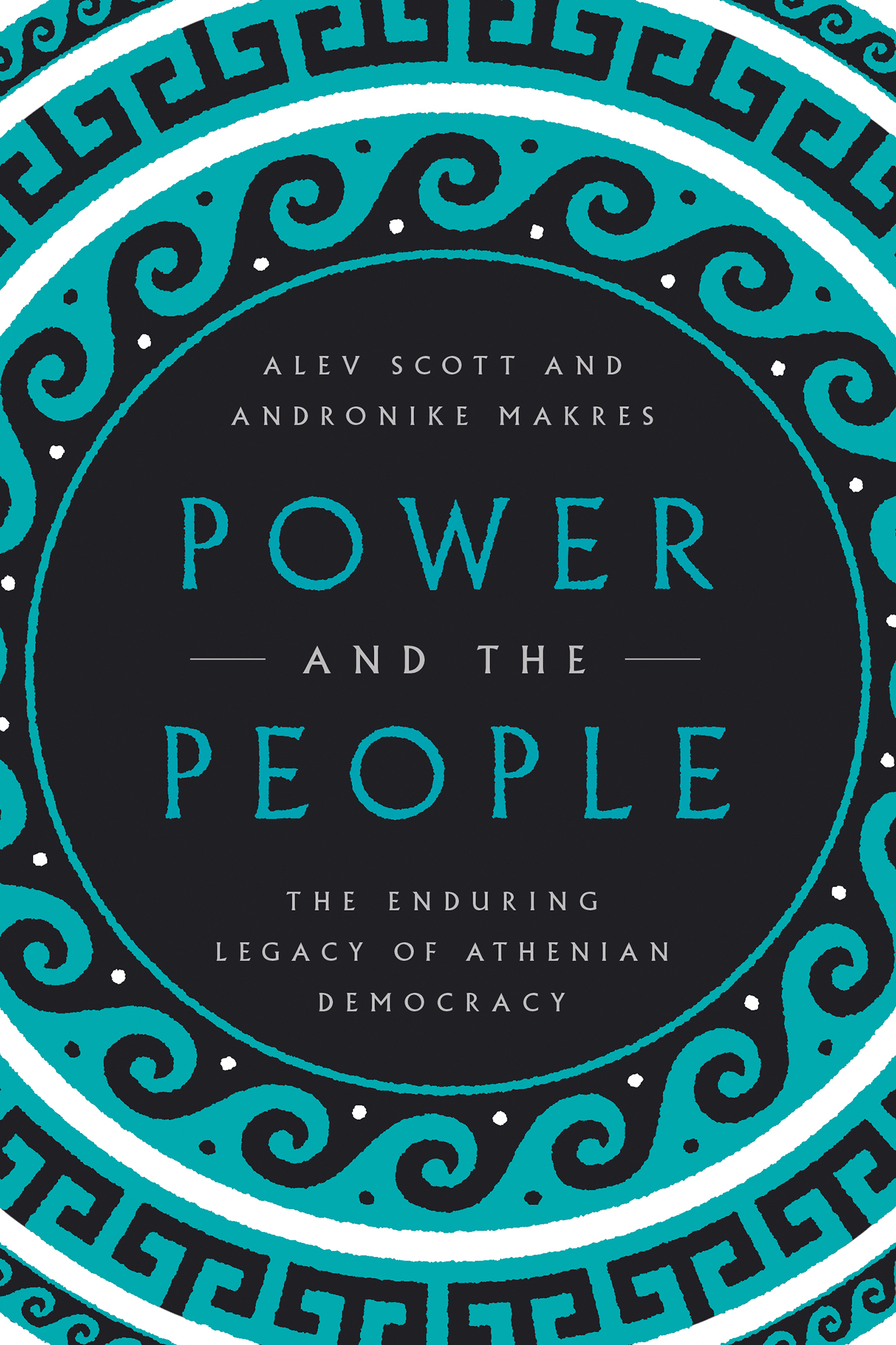

Also by Alev Scott
Turkish Awakening: Behind the Scenes of Modern Turkey
Ottoman Odyssey: Travels Through a Lost Empire
POWER AND THE PEOPLE
Pegasus Books Ltd.
148 W 37th Street, 13th Floor
New York, NY 10018
Copyright 2020 by Alev Scott and Andronike Makres
First Pegasus Books edition September 2020
All rights reserved. No part of this book may be reproduced in whole or in part without written permission from the publisher, except by reviewers who may quote brief excerpts in connection with a review in a newspaper, magazine, or electronic publication; nor may any part of this book be reproduced, stored in a retrieval system, or transmitted in any form or by any means electronic, mechanical, photocopying, recording, or other, without written permission from the publisher.
Cover design by Faceoutstudio, Lindy Martin
Cover image by Shutterstock
Library of Congress Cataloging-in-Publication Data is available.
ISBN: 978-1-64313-562-5
Ebook ISBN: 978-1-64313-563-2
Distributed by Simon & Schuster
www.pegasusbooks.com
ALL DATES ARE BC
- Earliest recorded event of Athenian History (failed attempt at tyranny by Cylon)
- Laws of Draco
- Laws of Solon
- 546510Tyranny of the Peisistratid family
- Assassination of Peisistratus son Hipparchus by Harmodius and Aristogeiton
- Fall of tyranny (Hippias) with the help of the Spartans
- Reforms of Cleisthenes
- Battle of Marathon (Persian Wars I)
- Battles of Thermopylae and Salamis (Persian Wars II)
- Formation of the Delian League
- 460sPerformance of Aeschylus The Suppliant Women
- Ephialtes reforms (stripping the Areopagus of most of its powers)
- Transference of the treasury of the Delian League from Delos to the Acropolis of Athens
- Pericles citizenship law
- Work for the building of the Parthenon begins
- 431404Peloponnesian War
- Funeral Oration delivered by Pericles
- Mytilenian Debate
- Performance of Aristophanes The Acharnians
- Performance of Aristophanes The Knights
- Performance of Aristophanes The Wasps
- Melian Dialogue
- Launch of the Sicilian Expedition
- Battle of Arginusae
- Tyranny of the Thirty established in Athens by Sparta
- Restoration of democracy
- Death of Socrates
- Battle of Chaeroneia victory of Philip II of Macedon over Greek city states led by Athens and Thebes
- Law against tyranny in Athens
- Expedition of Alexander the Great begins
- Statue of personified Demokratia dedicated in the Athenian Agora by the Council of Five Hundred
- Macedonian domination over Athens; Athenian democracy stifled. Death of Demosthenes
- 307287Democracy restored in diluted form under the shadow of Macedon
Translations of Aeschylus, Aristophanes and Thucydides are by Jeffery S. Clackley, 2019. Unless otherwise stated, translations of other ancient sources and inscriptions are our own.
The ancient year started in the summer, so each ancient year covered the second half of one year and the first half of the next, hence 505/504 BC . We can only give a date as 505 BC if we know the month of the historical event in question.

The owl of Athena (symbol of wisdom), shown on the reverse of Athenian silver coins of 5th century BC .
Democracy is feeling her age. It has been some time since she was honoured as a goddess, and even longer since she first appeared as an antidote to one-man rule. Today she is in crisis, in need of overhauling or even rebooting, like an old computer. According to some political scientists, we will soon be living in a post-democratic world, once the Internet and ever-spiralling polarization have brought about her untimely demise. Others argue that technology is democracys only hope, bringing power to the peoples smartphones in a way that mimics the purer style of ancient direct democracy, saving us from the cranky old institutions we have begun to reject.
Before we get too alarmist, it is worth reminding ourselves that democracy has already disappeared and returned once (with a two millennia hiatus), and its essence has always been the same. Demokratia means the power (kratos) of the people (demos), a concept that was born in Athens at the end of the sixth century BC and flourished until 322 BC, when Macedonian rule forced the Athenians to dissolve their government and establish a plutocratic system in which only rich individuals could remain citizens. After this point, the institutions of democracy were resurrected in a weakened, zombie form, without the independence and freedom they once had. Demokratia was used as a positive term for a few more centuries but it meant merely social stability, or cohesive society. The Roman Republic, despite its admiration for certain elements of Athenian society, regarded a democratic system of government as absurd, preferring the oligarchic constitution of Sparta.
Democracy effectively vanished from the world until the eighteenth century, when it returned in spirit with the revolutions in France and America, and developed with the republics that emerged from these revolutions. Direct democracy was still considered an outrageous idea, however, and the founding fathers of the United States of America chose to model their constitution on the Roman Republic rather than on Athens (although there is an increasingly fashionable theory that the United States current superpower status is the modern incarnation of the Athenian Empire). Even after the formation of new republics and growing enfranchisement across Europe in the nineteenth century, the word democracy was not really popularized until the early twentieth century. All too soon, it seems to be in danger of becoming obsolete.
If the first incarnation of democracy lasted around two hundred years, and we are now at the end of the two-hundred-year span of its second incarnation, the pessimistic among us might start preparing for the next hiatus. Or we might look back to work out how we can save democracy from crisis this time round. Nietzsche believed that we require history for life and action, not for the smug avoiding of life and action Only so far as history serves life will we serve it. In other words, we should study history to the extent that it is useful to us; we can learn both from the mistakes and the successful innovations of democracys ancient pioneers. Today, democracy is generally acknowledged as the best form of government, even though many of us are living in extremely flawed versions, and this assumption means there is not enough conversation about how to fix its flaws. Conversely, in ancient Athens there was vigorous debate about the best form of government oligarchy (the rule of the few) versus democracy (the rule of the many) being the most contentious. Supporters of the latter had to actively defend and reinforce its legitimacy.
By ancient Athenian standards, the type of democracy many of us experience today is in fact an oligarchy. Many of us choose not to vote, usually through apathy, or a belief that our vote does not matter, and we have almost nothing to do with government. In effect, we are ruled indirectly by the minority of the electorate who vote for our representatives. In Athens, citizens voted on every decision, and a great proportion had an active role in government. The electorate was narrowly defined, yes a problem we will come to but power was firmly in their hands in a way that seems outrageously radical today.
Font size:
Interval:
Bookmark:
Similar books «The Enduring Legacy of Athenian Democracy»
Look at similar books to The Enduring Legacy of Athenian Democracy. We have selected literature similar in name and meaning in the hope of providing readers with more options to find new, interesting, not yet read works.
Discussion, reviews of the book The Enduring Legacy of Athenian Democracy and just readers' own opinions. Leave your comments, write what you think about the work, its meaning or the main characters. Specify what exactly you liked and what you didn't like, and why you think so.


